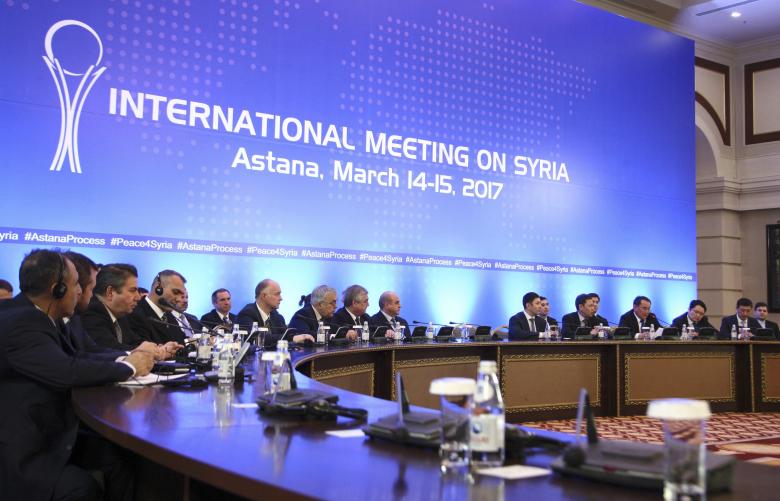Beirut-The “Astana 3” intra-Syrian talks held for two days in the Kazakh capital ended with no progress on Wednesday.
A statement first announced that the meetings will conclude on Wednesday morning, but later Russian officials asserted that the talks would be extended for one more day, saying opposition factions were expected to arrive in Astana on Wednesday.
Later, the negotiations concluded with another surprise: the admission of “Iran” as a new “guarantor” for the ceasefire in Syria, a development which the opposition forces considered a clear message on the end of the “Astana” path.
Colonel Fateh Hassoun, a member of the opposition negotiating team in Geneva, told Asharq Al-Awsat that the opposition’s decision to boycott the talks in Astana was final.
He added: “Admitting Iran as a guarantor is similar to hammering the last nail into the coffin of the Astana talks.”
Alexander Lavrentyev, who heads the Russian delegation to Astana, said a new meeting on Syria was planned for April 18-19 in Tehran.
But Hassoun said the armed opposition factions would not visit Iran, whether for a meeting or any other purpose.
Delegations of Iran, Turkey and Russia have been meeting in the Kazakh capital in the absence of representatives from armed rebel groups that decided to stay away from the talks after saying regime forces and their allies were violating the ceasefire deal.
An informed source told Asharq Al-Awsat that boycotting Astana would place the opposition in front of a new stalemate during the upcoming talks in Geneva on March 23.
Following their two-day meeting in Astana, the participating delegations of the three countries issued a statement on Wednesday affirming that the next international meeting on Syria in Astana is scheduled for May 3-4.
UN Syria envoy Staffan de Mistura, who is mediating a parallel process in Geneva, told Reuters negotiations to end the war needed to speed up. He said the conflict was becoming “one of the nastiest and most cruel wars of recent years”.
Meanwhile in Damascus, a double suicide bombing shook the center of the Syrian capital, leaving dozens of casualties.
At least 40 people were killed when a suicide bomber rushed inside a courthouse in the Hamadiya area before another suicide bomber blew himself up in a restaurant in the city’s Rabweh district.
The rising number of suicide bombings that have targeted Damascus lately draws question marks on the ability of the perpetrators to infringe the security perimeter placed around the capital.
